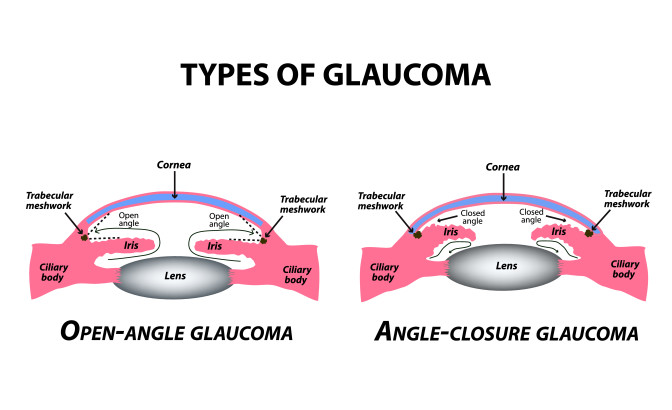Buy one pair of eyeglasses, get a second pair 50% off!
*Restrictions apply. Click here for details.
What is Glaucoma?
Glaucoma is a group of eye diseases that affect the optic nerve. It can develop gradually over time with little to no symptoms, but if left unaddressed this condition can cause permanent vision loss and blindness.
There are several types of glaucoma, all caused by an increase in eye pressure that damages the optic nerve. Your eyes are filled with fluid, and if this fluid doesn't drain properly, it can build up and create pressure in the eye. Over time, that pressure can compress and damage your optic nerve fibers. If these fibers are permanently damaged and die off, it can lead to blurred vision or even permanently losing vision in those areas. Learn more from the eye doctors at The EyeDoctors Optometrists about different types of glaucoma and treatment options.

Different Types of Glaucoma
Signs and Symptoms of Glaucoma
Most forms of glaucoma develop slowly over time, and you may not notice any symptoms at all. In time, you may have subtle vision changes or lose vision, but these may not necessarily raise any red flags.
The most common symptoms of glaucoma include:
Vision loss, especially on the side of your eyes and toward the center of your nose
Halos of light in your field of vision
Blurry or cloudy vision
If you’re experiencing any of these symptoms, scheduling a comprehensive eye exam at The EyeDoctors Optometrists can help identify any eye conditions or diseases you might have.
One type of glaucoma — angle-closure glaucoma — can come on quickly and requires immediate treatment. Intense eye pain, or eye pain that occurs alongside nausea or upset stomach, is common with this type of glaucoma. If you experience these symptoms with any vision loss, red eyes, or blurry vision, seek medical attention right away.
Glaucoma Treatment Options
The doctors at The EyeDoctors Optometrists treat glaucoma with a variety of therapies including medications, laser therapy, and surgery.
Eye drops are the most common medications used to treat glaucoma, and these can work in two ways. One type of eye drop works to lower eye pressure by helping more fluid drain from your eye. Another group of medications works by reducing the amount of fluid your eye makes to begin with. These eye drops must be used every day, and your doctor may add oral versions if you need more relief. Side effects of these medications can include things like:
Stinging, itching, burning or redness in your eye
Dry mouth
Blurry vision
Headaches
Your doctor may also need to perform laser therapies or surgeries to help fluid drain from your eye. This is usually done by making a small hole for fluid to drain from or by inserting a tiny drain to help fluid move out of your eye. With any of these treatments, there is a chance that they may need to be repeated in the future if fluid continues to build. Learn more about treatment options from The EyeDoctors Optometrists.
Living with Glaucoma
There is no way to prevent glaucoma, and the exact cause of this group of diseases is unknown. Glaucoma does tend to run in families. There are several risk factors associated with the condition, including:
Family history of glaucoma
Age 60 or higher
African American and Hispanic descent
Diabetes
High blood pressure
Heart problems
Eye injuries
Eye inflammation
Cornea disorders
Retinal problems
Prolonged corticosteroid use
Regular eye exams are an important part of your overall eye health, and they can help identify problems like glaucoma early. There is no cure for this condition, but early treatment may help you avoid total vision loss.
Schedule An Appointment Today

Contact the The EyeDoctors Optometrists team and find a location close to you to schedule an eye exam today.
